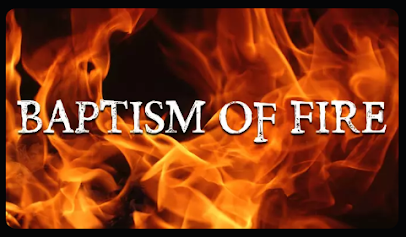The concept of the Holy Spirit and its association with "baptism by fire" is a subject that has intrigued theologians, scholars, and believers alike. This Blog post delves into the Biblical understanding of these terms, particularly focusing on their significance, interconnectedness, and implications for the Christian life. The scripture cited comes from the King James Version (KJV) of the Bible.
The Holy Spirit in the Bible
As discussed in previous theological explorations, the Holy Spirit is a central figure in both the Old and New Testaments. It is often described as the third person of the Trinity, co-equal with God the Father and God the Son. The Holy Spirit's roles are multifaceted, serving as a Comforter, Teacher, and Guide, among other functions. One of the most dramatic manifestations of the Holy Spirit occurs on the Day of Pentecost, as described in Acts 2:2-4:
"And suddenly there came a sound from heaven as of a rushing mighty wind, and it filled all the house where they were sitting. And there appeared unto them cloven tongues like as of fire, and it sat upon each of them. And they were all filled with the Holy Ghost, and began to speak with other tongues, as the Spirit gave them utterance."
Baptism by Fire: The Concept
The term "baptism by fire" is often misunderstood or taken out of context. In the New Testament, it is John the Baptist who first introduces this concept. In Matthew 3:11, John says:
"I indeed baptize you with water unto repentance: but he that cometh after me is mightier than I, whose shoes I am not worthy to bear: he shall baptize you with the Holy Ghost, and with fire."
Here, John distinguishes between his own baptism with water and the baptism that Jesus will administer, which involves both the Holy Spirit and fire.
The Interconnectedness of the Holy Spirit and Baptism by Fire
The connection between the Holy Spirit and baptism by fire is evident in several ways. First, both are associated with purification. Just as fire refines and purifies metals, the Holy Spirit works in the lives of believers to sanctify and purify them. Second, both are linked to empowerment. The disciples were empowered by the Holy Spirit at Pentecost, symbolized by tongues of fire, to preach the Gospel and perform miracles.
In the Bible, God is likened to a consuming fire and a refiner’s fire, while the baptism in the Spirit is spoken of as a baptism of fire.
Implications for Christian Life
Understanding the concept of baptism by fire in conjunction with the Holy Spirit has profound implications for the Christian life. It suggests a transformative experience that goes beyond mere ritual or symbolism. Believers are not only cleansed but also empowered to live a life that glorifies God. The Apostle Paul, in Romans 8:26, emphasizes the role of the Spirit in helping us in our weaknesses:
"Likewise the Spirit also helpeth our infirmities: for we know not what we should pray for as we ought: but the Spirit itself maketh intercession for us with groanings which cannot be uttered."
The Holy Spirit and the concept of baptism by fire are deeply intertwined in the Biblical narrative. They are not just theological constructs but experiential realities that have the power to transform lives. The Holy Spirit is not merely a passive presence but an active force that purifies, sanctifies, and empowers believers. Baptism by fire, far from being a mere metaphor, signifies a transformative experience that every believer can encounter. Understanding these concepts can deepen our faith and enrich our walk with God as we yield to the sanctifying and empowering work of the Holy Spirit in our lives.



No comments:
Post a Comment